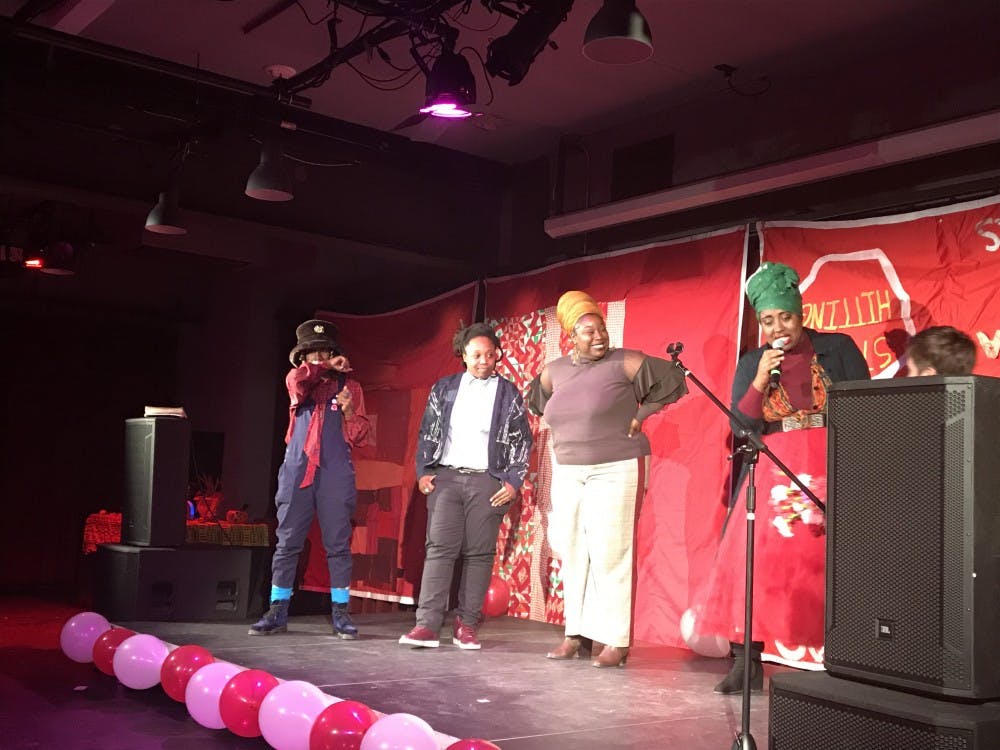“Hear Our Stories: Celebrating Black Victim-Survivors,” an event focused on supporting black women and non-binary people affected by sexual violence, took place at The Motor House on Thursday, Jan. 31. The event was hosted by FORCE, a Baltimore nonprofit that aims to shift the narrative surrounding sexual violence through different forms of advocacy.
One such form of advocacy is the Monument Quilt, a nationally-recognized large-scale display in which survivors of sexual violence share their stories on many pieces of red fabric stitched together to form a quilt. The Quilt has been displayed at Hopkins for the past few years and is scheduled to be presented at the National Mall within the next few months.
The event at Motor House served as a similar outlet for survivors to tell their stories and shift the narratives surrounding their experiences. It consisted of open discussions, performances, a dinner and a letter-writing campaign for a mother who was imprisoned for defending herself against an abusive husband.
Charnell Covert, a member of FORCE and event’s emcee, explained that the event was inspired by the release of the docuseries Surviving R. Kelly. The docuseries highlights accusations of sexual violence by several women and girls against R&B artist R. Kelly.
During the open discussion, several participants shared experiences of childhood sexual abuse or intimate-partner violence. Participants explored the complexities in the lingering attachment to their abusers that some survivors retain. Some examined the distinctions between sexual and emotional abuse. Others questioned how they could best support friends in abusive relationships who are unwilling to leave their abuser.
Covert summarized the discussion with a question: How does one bear witness to and support black women, girls and gender-nonconforming individuals?
While reflecting on their lives as victims and survivors of past sexual assault, participants also discussed the impact of word choice in defining their experiences. The term “victim-survivor” was introduced as a broadly inclusive term for those who are still recovering — victims — and those who feel that they have overcome their abuse — survivors.
The performances, which included music, comedy and poetry, were based on similar ideas.
Aditi Wagh, a graduate student in the Social Design program at the Maryland Institute College of Art (MICA), discussed the widespread prevalence of sexual violence in an interview with The News-Letter. Having done social work in India, she drew connections between the struggles of communities in India and those in Baltimore.
“Back in India, I used to work with victims of commercial sexual exploitation. I have interacted with women and children who have suffered sexual abuse. When I learned about this event, I also wanted to know about the frustration here and be a part of that journey,” she said.
Sarah Dunn, Wagh’s classmate at MICA, echoed her sentiments about wanting to become part of the wider Baltimore community’s conversations surrounding sexual violence.
“We are here to be more a part of the community. We have been going to a lot of different programs in the area,” she said.
In addition to exploring sexual violence in Baltimore, “Hear Our Stories” focused specifically on the struggles that black people face with regard to sexual violence. Several speakers delved into ways in which stereotypes of black women and perceptions of women in the media have contributed to a culture in which sexual violence and subjugation are glorified or, at the very least, have been made permissible.
More specifically, speakers discussed how prevalent these stereotypical narratives are in popular music and movies. Discussions about the R. Kelly accusations also figured into dialogues about how sexual violence affects the black community.
Unique Mical Robinson, a professor at MICA, has been affiliated with FORCE since 2016. Robinson read a poem about her experience as a victim-survivor of child molestation and sang two original songs.
For Robinson, FORCE is an organization that brings attention to the persistent prevalence of rape culture in a society whose values are constantly changing, especially in the context of the #MeToo movement and the Women’s March.
“I respect [FORCE’s] work and I think that it is very necessary in this time of change in the culture around patriarchy. It is also necessary for how we talk about rape and victim-survivors who survived it,” she said in an interview with The News-Letter.
Robinson explained that her performance at the event was three-pronged: She talked about the abuse, placed it in the context of Baltimore City and then discussed healing.
“Eventually, we must let go of that which harmed us, and that shows just how strong we actually are,“ she said. “In being vulnerable, we actually are strong.”





